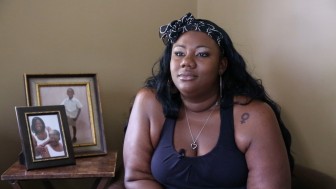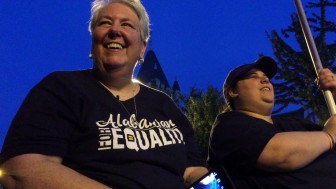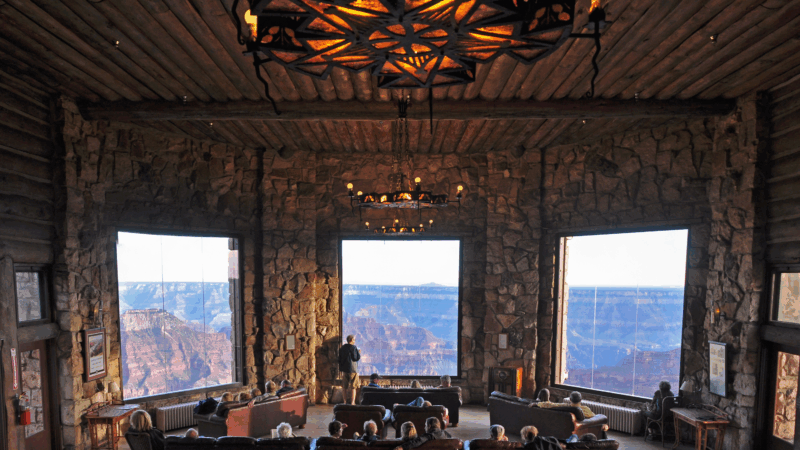New Documentary Highlights Lesbian Struggle for Equality in Alabama
A new documentary —Alabama Bound– follows the lives of three lesbian couples and their struggles for equality. There’s a custody battle, another couple’s quest to adopt the child they raised, and one woman’s fight for LGBT rights in Alabama. The film was inspired by a 2012 art exhibition about lesbian couples in the Deep South created by artist Carolyn Sherer who co-directed the documentary. The film premieres Sunday, October 22, at NewFest: New York City’s LGBT Film Festival. It was produced by Michele Forman, director of the media studies program at the University of Alabama at Birmingham. WBHM’s Esther Ciammachilli spoke to Carolyn Sherer and co-director Lara Embry.
On why they chose to follow only lesbian couples
“The reason we are focusing on lesbians is that in the Birmingham area they’ve been previously invisible,” Sherer says. “And partly that may be because of the AIDS crisis and the attention that was placed on what was going on in in the 80s in Birmingham.”
“I think part of why I was attracted to the idea of focusing on lesbian families in the South was we decided to kind of explore the family values of our subjects, and wanted to do so in a way that would be accessible and emotionally engaging for people who might not previously have been allies to the community,” says Embry. “And frankly I think in the South particularly, lesbians are less threatening than gay men to a lot of people in the culture.”
On the difficulties of making this film
“I think the hardest part of making the film was the fact that the story kept changing,” Sherer says. “You know we thought we had a wrap and because of the political situation particularly in Alabama with Judge [Roy] Moore things continue to evolve.”
Roy Moore plays a prominent role in the film due to his role in the fight against marriage equality and LGBT rights in Alabama. Since filming began, Moore has been removed from his position as chief justice. Now he’s the GOP candidate for Senate. What does it say about voters in this state?
“I think that it says that there are many voters in this state who are party loyal and can’t stomach the idea of voting for a Democrat,” says Embry. “We have polarized ourselves to where people will vote for a candidate who’s not qualified because that’s the candidate nominated by their party.”
“I think also it points to the issue that we have in this state where there’s often a blurred line between church and state,” Sherer adds. “That is not the case across the country.”
On whether the idea of separation of church and state will ever take hold in Alabama
“I think that churches are changing in Alabama,” says Sherer. “Ten years ago, there were no churches or few churches that really accepted gay people. Now we see many churches that are advocating for the gay community. So I do think it’s going to change.
On what they would want Roy Moore to take away from this film if he were to watch it
“I would love from Roy Moore is just a moment of empathy,” says Embry. “And I think that’s what we were trying to evoke with this film was empathy with the injustices that our characters face. I think if he were to feel that he might at some in some way question the dogma that he ascribes to.”
On Emby and Sherer’s thoughts on June 26, 2015, the day the U.S. Supreme Court legalized same-sex marriage
“I felt relieved that that excursion to the Supreme Court turned out as we thought,” Embry says. “I felt happy for the people who we have been following who we knew would be impacted by that decision. And hopeful. I can’t say I feel that way anymore. I think in some material ways the landscape has changed. We have moved backwards. And on that day at least it really felt like everything was moving forwards.”
HBO’s new Billy Joel documentary is revelatory — even if it pulls some punches
The new two-part documentary, which premieres Friday on HBO, is a good example of the tension between access and objectivity that filmmakers face in making documentaries on celebrities.
A wildfire destroyed the historic Grand Canyon Lodge. It burned down once before
The Grand Canyon Lodge is the only hotel on the park's North Rim, which is closed for the rest of the season due to wildfire risk. The hotel was already rebuilt once, after a kitchen fire in 1932.
Why the Federal Reserve’s building renovations are attracting the White House’s ire
The Fed's $2.5 billion headquarters renovation is attracting mounting criticism from the Trump administration, which had been already attacking the central bank for not cutting interest rates.
Supreme Court says Trump’s efforts to close the Education Department can continue
The Trump administration had appealed a decision that had directed it to stop gutting the U.S. Education Department and to reinstate many of the workers the government had laid off.
24 states sue Trump admin to unfreeze more than $6 billion in education grants
The lawsuit comes two weeks after the Trump administration first notified states it was withholding previously approved funds for migrant education, before- and after- school programs and more.
Where to start? This week’s new releases are an all-you-can-read buffet
This week, new horror from Silvia Moreno-Garcia, a funny college do-over from Jeneva Rose, and autofiction from Hannah Pittard. Plus, stories about the American South, and a deep dive into the Earth.










